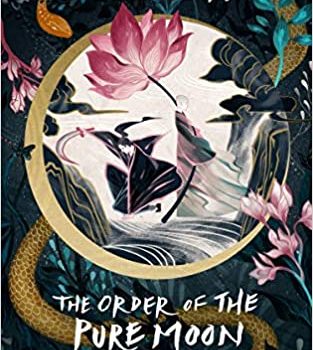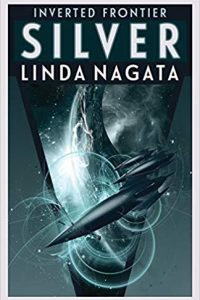Gary K. Wolfe and Liz Bourke Review The Order of the Pure Moon Reflected in Water by Zen Cho
 The Order of the Pure Moon Reflected in Water, Zen Cho (Tor.com 978-1-250-26925-6, $19.99, 160pp, hc) June 2020. Cover by Sija Hong.
The Order of the Pure Moon Reflected in Water, Zen Cho (Tor.com 978-1-250-26925-6, $19.99, 160pp, hc) June 2020. Cover by Sija Hong.
After decades of movies, games, manga, and TV, it might well be that contemporary audiences are more familiar with the conventions of wuxia than with the classic American Western – not that there isn’t a fair amount of overlap. The crucial opening scene of Zen Cho’s The Order of the Pure Moon Reflected in Water, for example, works just as well in either tradition: a bandit enters a coffeehouse, examines a wanted poster, and then steps in, along with an older bandit who has just entered, to defend a young waitress from a bullying, irate customer. Replace the coffeehouse with a saloon, and this scene would not be out of place in any number of classic Westerns. From there Cho heads off very much in her own direction, though: the waitress, actually a long-sequestered nun named Guet Imm from the Order of the Pure Moon Reflected in Water, loses her job over the incident and decides to join the bandit and his gang, who turn out to be the subjects of that wanted poster. The gang members, who describe themselves as ”roving contractors,” are at first reluctant to accept her offer of cooking and cleaning, especially after they learn she can’t really cook and after she informs them that, according to her vows, ”she’d have to chop off the dick of any man she fucked.” Guet Imm manages to charm most of the bandits, especially befriending Tet Sang (who turns out to have a few secrets of his own), and she insists on accompanying them as they deliver some secretive smuggled goods to the Malaysian town of Sungai Tombak. When the deal goes awry, Guet Imm finds her role among the bandits shifting, and the experience of her years in the tokong or temple becomes useful in unexpected ways.
Cho’s characters are hardly in any sense traditional wuxia heroes, and she uses elements of the tradition to develop a graceful and often quite witty interrogation of issues of loyalty, friendship, trust, and gender identity. As with Tidhar’s characters, the dialogue is modernized in ways that at times echo the sharp banter of a good romcom, while the moral principles or ”devotional practices” of Guet Imm’s order underlie her behavior throughout, eventually revealing some secrets of her own, which appear to laypeople as magic. But The Order of the Pure Moon Reflected in Water doesn’t depend on its limited deployment of the fantastic for its best effects; instead, its appeal derives from watching a smart, appealing, and intelligent woman finding her identity among a not-always-honorable ragtag band of thieves, and making a choice in the end that is satisfyingly consistent with what she’s learned. Guet Imm may have only a pretty short novel in which to make her case, but she’s one of the more memorable characters I’ve met in recent fantasy.
–Gary K. Wolfe
Zen Cho is a writer whose reputation looms larger than the volume of her work to date might suggest. With a history of award nominations and wins that includes the Hugo Award, and a strongly received debut pair of novels in Sorcerer to the Crown and The True Queen, there can be little doubt as to her skill or talent.
Her latest work is a novella from Tor.com Publishing, The Order of the Pure Moon Reflected in Water. This slender volume is a deft and elegant re-envisioning of wuxia for an Anglophone audience. My knowledge of the tropes and narrative setpieces that Cho is clearly drawing on here is, let’s be honest, fairly slim: I know just enough to appreciate that there are layers and references I’d be much better able to appreciate if I knew more about the history and aesthetics that strongly influence The Order of the Pure Moon Reflected in Water. (I know enough to be delighted at the combination of playfulness and seriousness on display here.)
The Order of the Pure Moon Reflected in Water opens without naming the characters that will later come to be important, from the point of view of an anonymous omniscient narrator. A beautiful bandit walks into a coffeehouse. His name is Fung Cheong. He gets into a fight defending the honour of the coffeehouse waitress.
The coffeehouse waitress is Guet Imm, a votary of the Order of the Pure Moon, who has been working in the coffeehouse since the destruction of the compound of the Order where she lived. As a result of the fight, she loses her job – so Guet Imm joins up with the bandits, whether they like it or not.
A less beautiful bandit, Tet Sang, who is Fung Cheong’s second-in-command and the planner of the group, is less than delighted with Guet Imm’s presence, although Tet Sang sympathises with her and would prefer her to be somewhere else, somewhere slightly safer than with their group.
The group, it turns out, are trying to sell a sacred object stolen from the Order of the Pure Moon. Guet Imm initially puts the worst interpretation on it. Shenanigans ensue. It turns out that Tet Sang has a surprising past, and Cho handles several delicate revelations and narrative twists with skill. The characterisation and worldbuilding here packs a great deal into a very small space, superbly drawn. Cho presents us with compelling people in a difficult world, and gives them all hidden depths.
What perhaps struck me most was the dialogue. Its register is clearly vernacular, but the choice of phrasing, styles of address, and syntactical differences reveal the cultural norms and considerations of the world Cho draws here, and subtly (and not-so-subtly) re-emphasises how that cultural context shapes the characters and their interactions with each other and the world.
I really enjoyed this novella. I’d happily read a dozen sequels. It has action and pathos and striking turns of phrase: it’s a small, perfectly shaped delight.
–Liz Bourke
Gary K. Wolfe is Emeritus Professor of Humanities at Roosevelt University and a reviewer for Locus magazine since 1991. His reviews have been collected in Soundings (BSFA Award 2006; Hugo nominee), Bearings (Hugo nominee 2011), and Sightings (2011), and his Evaporating Genres: Essays on Fantastic Literature (Wesleyan) received the Locus Award in 2012. Earlier books include The Known and the Unknown: The Iconography of Science Fiction (Eaton Award, 1981), Harlan Ellison: The Edge of Forever (with Ellen Weil, 2002), and David Lindsay (1982). For the Library of America, he edited American Science Fiction: Nine Classic Novels of the 1950s in 2012, with a similar set for the 1960s forthcoming. He has received the Pilgrim Award from the Science Fiction Research Association, the Distinguished Scholarship Award from the International Association for the Fantastic in the Arts, and a Special World Fantasy Award for criticism. His 24-lecture series How Great Science Fiction Works appeared from The Great Courses in 2016. He has received six Hugo nominations, two for his reviews collections and four for The Coode Street Podcast, which he has co-hosted with Jonathan Strahan for more than 300 episodes. He lives in Chicago.
Liz Bourke is a cranky queer person who reads books. She holds a Ph.D in Classics from Trinity College, Dublin. Her first book, Sleeping With Monsters, a collection of reviews and criticism, is out now from Aqueduct Press. Find her at her blog, her Patreon, or Twitter. She supports the work of the Irish Refugee Council and the Abortion Rights Campaign.
This review and more like it in the June 2020 issue of Locus.
 While you are here, please take a moment to support Locus with a one-time or recurring donation. We rely on reader donations to keep the magazine and site going, and would like to keep the site paywall free, but WE NEED YOUR FINANCIAL SUPPORT to continue quality coverage of the science fiction and fantasy field.
While you are here, please take a moment to support Locus with a one-time or recurring donation. We rely on reader donations to keep the magazine and site going, and would like to keep the site paywall free, but WE NEED YOUR FINANCIAL SUPPORT to continue quality coverage of the science fiction and fantasy field.








